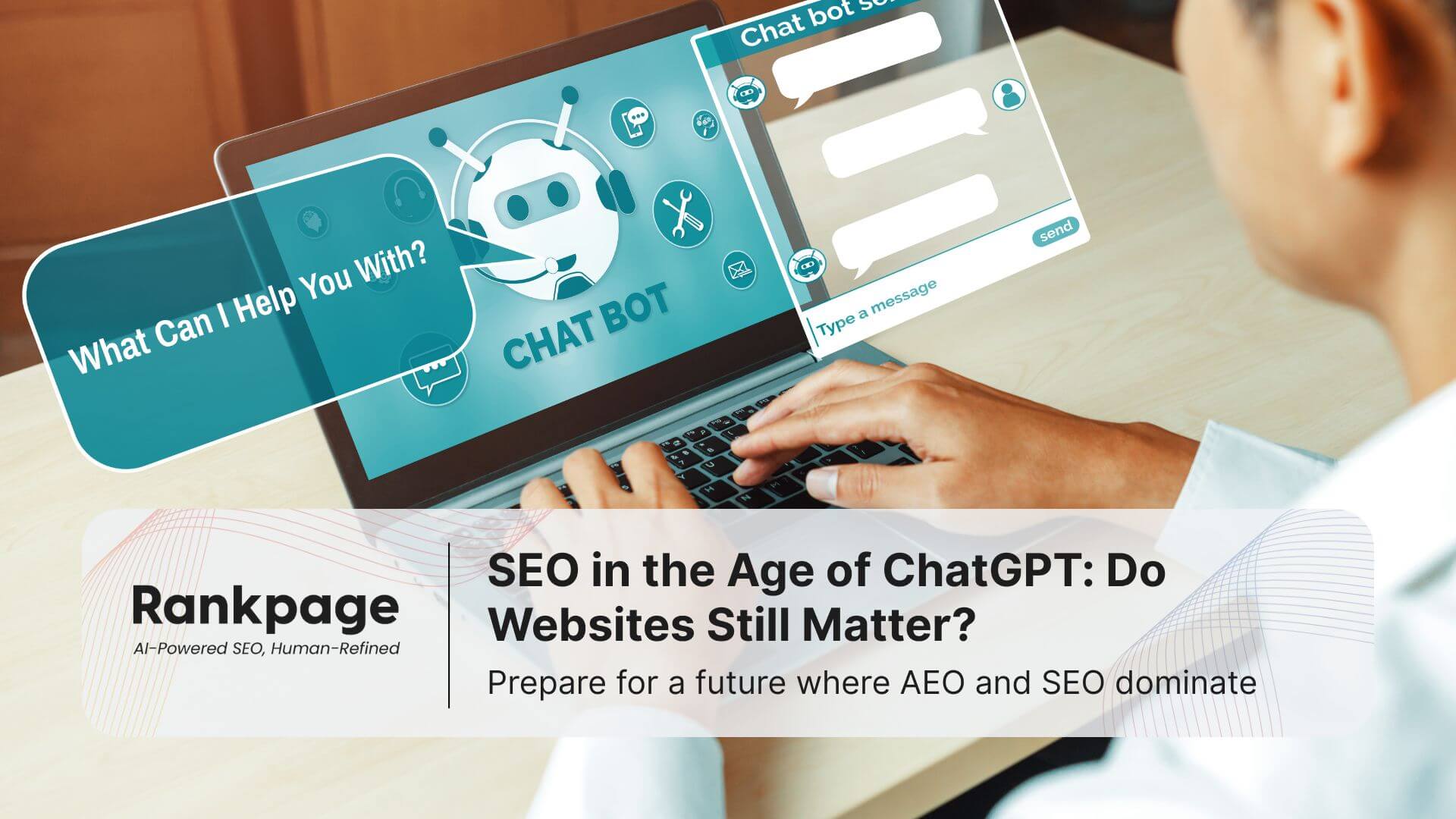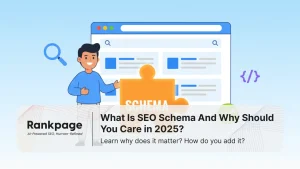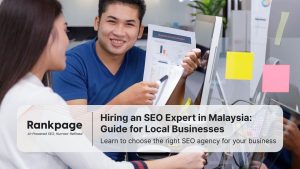Key Takeaways
- Websites still matter because AI tools like ChatGPT need content sources to generate accurate answers.
- SEO isn’t dead, it’s evolving. Businesses must optimise for both AI-driven search and Google’s traditional rankings.
- On-page elements remain vital. Content quality, schema, and user experience fuel AI snippets and overviews.
- Off-page signals grow stronger. Backlinks, reviews, and authority cues help AI decide which brands to cite.
- Rankpage helps future-proof SEO, blending traditional optimisation with AEO (Answer Engine Optimisation) for visibility in both Google and AI tools.
No, your website isn’t going anywhere. But how people find them is changing fast.
ChatGPT, Gemini, Google’s AI Overviews, and other generative search tools are rewriting how Malaysians discover information online.
Instead of clicking through the top 10 blue links on Google, users are getting instant answers right in the search box.
But this begs the questions, if AI can answer customer questions directly, will they ever bother visiting your website? Will your traffic just vanish
Today, the leading SEO agency in Malaysia will break down what ChatGPT really means for SEO and why websites will remain as your digital HQ.
Table of Contents
What Does ChatGPT Mean for SEO?
ChatGPT changes how people search, not whether they need your website.
Instead of typing “best nasi lemak in PJ” into Google and scrolling through links, users can now ask ChatGPT or Google AI’s: “Where’s the best nasi lemak near me?” and get an instant, conversational answer.
For businesses, this means:
- Zero-click searches are rising: Users may see your brand mentioned without clicking your site.
- Visibility shifts to citations: Being quoted or linked inside AI answers becomes as valuable as ranking #1.
- Content quality matters more: AI won’t cite thin, spammy content. It looks for depth, clarity, and authority.
In short: SEO is no longer just about ranking. It’s about being referenced by AI.
Do Websites Still Matter in the Age of AI?
Yes, because AI needs websites to survive.
ChatGPT and Google’s SGE don’t magically generate knowledge. They pull information from existing content, blogs, product pages, research articles, and service websites, then repackage it in conversational form.
“Without websites constantly publishing new and trustworthy content, AI tools would have nothing fresh or reliable to say.”
AI won’t kill websites any more than calculators killed math. But it does mean SEO in the future looks different.
Visibility now isn’t just about “ranking number one” it’s about creating content that search engines and AI assistants recognise as worth citing.
Websites remain the only digital space where you can:
- Control your brand message: Social media, reviews, and AI summaries can distort or oversimplify your story. Your website is where you set the record straight.
- Convert visitors into customers: Whether through enquiry forms, online bookings, or e-commerce checkouts, conversions still happen on your site, not in an AI chat box.
- Build long-term trust signals:Design, testimonials, certifications, and case studies show credibility. AI can mention you, but it can’t display your proof the way your website can.
Think of it this way: AI is like GrabFood. Convenient for customers, yes but restaurants still need kitchens to cook the meals. Your website is that kitchen. Without it, there’s nothing to prepare, package, or deliver.
Read more: How Long Does SEO Take to Show Results? The Answer Will Surprise You
SEO vs AI: What’s Changing (and What’s Not)
Here’s a clearer comparison on the different between the two:
Factor | Traditional SEO (Pre-AI) | SEO in the Age of ChatGPT |
User Behaviour | Search → click → read | Ask → get instant AI summary → maybe click |
Content Needs | Keyword-targeted blog posts, landing pages | Conversational, structured, EEAT-rich content |
Visibility Metric | Ranking on page one | Being cited in AI answers + Google results |
On-Page SEO | Titles, headings, schema, speed | Still important, AI relies on clean signals |
Off-Page SEO | Backlinks & reviews build trust | Authority even more important for AI citation |
What’s not changing? Quality content and authority remain non-negotiable.
How Businesses Should Adapt SEO for the Age of ChatGPT
If you’re handling SEO on your own, here’s the good news: the playbook isn’t gone, it’s simply upgraded.
Just like a major Google Core Update, things shift, some tactics stop working, but the businesses that adapt quickly find new ways to thrive.
Here’s how businesses can future-proof their SEO in the AI era:
1. Optimise for Conversational Queries
Write content the way people ask questions, not just the way they type keywords.
- Focus on formats like: “What is…?”, “How to…?”, “Where can I…?”
- These are the same queries that trigger Google’s People Also Ask boxes and AI summaries.
- Create FAQ sections, knowledge hubs, or blog posts that mirror customer conversations.
Example: Instead of just “dental services Johor Bahru,” a clinic could target “How long does wisdom tooth extraction take?” That phrasing matches how users ask AI tools for help.
2. Use Structured Data (Schema)
Make it easier for AI and search engines to ‘read’ your site.
- Apply FAQ schema, product schema, and review schema.
- This markup helps Google and AI Overviews cite your content correctly.
- Think of schema as labels on supermarket shelves, it tells AI exactly what’s inside.
If a local retailer adds product schema to their e-commerce site, AI tools can instantly pull accurate prices, availability, and reviews without needing to click inside!
3. Double Down on EEAT
AI doesn’t just want content, it wants trustworthy content.
- Add author bios to blog posts (who wrote it, why they’re credible).
- Cite reputable sources, research, and statistics.
- Showcase certifications, awards, or testimonials.
“Trust is the most important member of the E-E-A-T family because untrustworthy pages have low E-E-A-T no matter how Experienced, Expert, or Authoritative they may seem.” — Google Search Quality Rater Guidelines
4. Think Beyond Clicks
Traffic alone isn’t the only success metric anymore.
- AI may answer a user’s query directly, but if your brand is cited, visibility still grows.
- Track mentions, impressions, and brand exposure, not just visits.
- Treat it as digital word-of-mouth: even if users don’t click today, they’ll remember your brand tomorrow.
For example, if a local café gets cited in Google SGE as “one of the top breakfast spots,” the brand earns credibility, even if the searcher doesn’t immediately click through.
The Role of Google’s SGE and Local SEO in Malaysia
For local businesses, AI-driven search makes local SEO more important than ever.
Google’s AI Overviews often pull from:
- Google Business Profile reviews
- Local directories (Malaysia SME Directory, FoodPanda listings.)
- Trusted websites with regional authority
That means a mamak in Penang or a salon in JB could get featured in an AI summary, but only if their local SEO is strong.
As a word of advice, always encourage customers to leave reviews, keep your Google Business Profile updated, and try to get listed in credible Malaysian directories to really boost your rankings.
These off-page signals fuel both Google rankings and AI answers.
What AI Can (and Cannot) Do for SEO
There’s a misconception that AI can do everything and while it’s certainly impressive, the human touch and expertise can never ever be replicated or replaced.
AI Can Do | AI Cannot Do |
Generate keyword ideas quickly | Understand local & cultural context (mamak vs café) |
Draft blog outlines and meta descriptions | Build genuine relationships for backlinks |
Analyse large datasets at speed | Prove real authority (certifications, case studies) |
Summarise existing content | Make business decisions aligned with sales goals |
Automate basic reporting | Adapt creatively to algorithm changes |
Takeaway: AI is a helpful assistant, but not a strategist. For SEO that actually drives growth, you still need human expertise.
How to Prepare For a Future Where AEO and SEO Dominate
As AI tools like ChatGPT, Gemini, and Google’s AI overview become everyday search companions, businesses need to stop thinking of SEO as just “rankings” and start seeing it as visibility across multiple platforms.
Here’s what to expect moving forward:
- Answer Engine Optimisation (AEO) will sit alongside traditional SEO. Websites must structure content for both search engines and AI assistants.
- Voice and conversational search will keep growing. People won’t just type queries; they’ll ask questions naturally.
- Local SEO signals like reviews and directories will weigh even more. AI often pulls from these when making recommendations.
- Trust will be everything. Websites with weak E-E-A-T won’t be referenced, no matter how many backlinks they buy.
For Malaysian businesses, the challenge is clear: keep investing in websites as your digital HQ, but adapt your SEO so it speaks the language of both Google and AI.
“Around 20.5% of people worldwide currently use voice search, and the number of voice assistants in use is expected to keep rising. – DemandSage
Rankpage Future-Proofs SEO in the Age of AI
At Rankpage, we’ve been in the SEO service industry for over 8 years, long enough to know that “the next big thing” comes and goes, but solid strategy always wins.
We don’t just react to trends; we build playbooks before they become the norm.
Here’s how we keep your business visible, no matter how search evolves:
- SEO Audit Checklist: Speed, mobile readiness, and schema tuned up so AI (and humans) actually understand your site.
- SGE Content Framework: Q&A, FAQ, and conversational formats crafted to land in AI summaries and Google’s People Also Ask boxes.
- Real-Time Performance Tracking: Because you shouldn’t have to wait a month to see if your investment is working.
- Authority Building: Backlinks, reviews, and PR mentions that both Google and AI trust.
- Transparent Reporting: Not just rankings, but impressions, mentions, and business outcomes that actually matter.
With Rankpage, you don’t just “rank” you show up everywhere your customers are searching: Google, ChatGPT, Bing Copilot, Gemini, and whatever comes next.
Frequently Asked Questions About SEO in the age of AI
Will ChatGPT replace Google search?
No. ChatGPT and Google SGE complement search, but Google remains the main entry point for most users.
Does SEO still matter in the age of AI?
Yes. AI tools still rely on optimised websites for content and authority signals.
What is AEO and why does it matter?
AEO = Answer Engine Optimisation. It’s about structuring content so AI tools can reference your site in summaries.
Will websites stop being relevant in 2025?
Not at all. They remain your digital HQ for conversions and trust.
How should small businesses adapt SEO to AI?
Focus on conversational content, structured data, reviews, and building authority signals that AI trusts.
Can Rankpage help me optimise for ChatGPT and Google SGE?
Absolutely. Rankpage blends traditional SEO with AEO to keep your business visible across both search and AI platforms.





